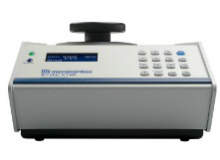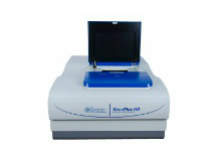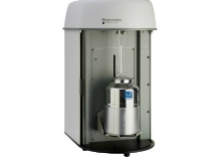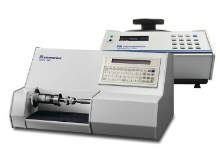Micromeritics’ GeoPyc 1360 Envelope Density Analyzer, an Important Analytical Tool for Pharmaceutical Roller Compaction Applications
Roller compactors have become commonplace in the production of solid dosage pharmaceuticals. Low API content formulations can be problematic if the appropriate steps are not taken to ensure adequate and consistent drug loading in each finished solid dosage form. Adding a roller compaction step to the process helps to ensure content uniformity. Small particle size API’s such as nanoparticles can be difficult to move and uniformly disperse in a powder or granulation bed. Movement of these materials becomes more predictable and consistent when the roller compaction step is incorporated into the process.
When adding a roller compactor, one must also consider specific analytical tests to monitor the performance of the device and to quantify and qualify the effects of subtle changes to the compactor’s settings. The density profile of the material produced during the compaction step should be monitored during the formulation, process development and production phases. Micromeritics’ GeoPyc 1360 Density Analyzer is an ideal tool for the determination of the bulk density of roller compactions and the ribbon created during the process.
The revolutionary GeoPyc 1360 is based on the Archimedes principal and utilises a quasi-fluid displacement medium composed of nonhazardous microspheres having a high degree of flowability. This novel approach eliminates the need for oils, solvents and mercury that are traditionally required as a displacement medium. Micromeritics’ patented DryFlo displacement material does not wet the sample or fill its external or internal pores. A light shaking or dusting completely removes the DryFlo after analysis, therefore the roller compaction ribbon can be reused or retested.
The GeoPyc collects the displacement data, performs the calculations and displays or prints the results. A variety of sample chambers is available to accommodate a wide range of sample sizes. Coupled with an absolute density technology (Micromeritics’ AccuPyc II 1340 Gas Displacement Pycnometer), the GeoPyc will calculate not only the bulk or envelope density of the ribbon, but also percent porosity and total pore volume.
Micromeritics offers a wide variety of instruments and lab services designed to help pharmaceutical scientists during discovery, formulation, production, and quality control. For more information on instruments and services for density, porosimetry, specific surface area and particle size visit our website.





